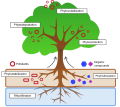Phytoremediation
Phytoremediation is a bioremediation process that uses various types of plants to remove, transfer, stabilize, and/or destroy contaminants in the soil and groundwater. There are several different types of phytoremediation mechanisms. These include phytoextraction, rhizofiltration, phytostabilization, phytodegradation, and phytovolatilization.
Mechanisms of Phytoremediation[edit]
Phytoextraction (also known as phytoaccumulation) exploits the ability of plants to take up substances from the soil through their roots and translocate them to their above-ground parts.
Rhizofiltration is a water remediation technique that involves the uptake of contaminants by plant roots. Rhizofiltration is used to reduce contamination in natural waters and wastewater.
Phytostabilization involves the production of chemical compounds by the plant, which immobilize the contaminant at the interface of root and soil.
Phytodegradation (also known as phytotransformation) is the breakdown of contaminants taken up into plant tissues to less toxic or non-toxic substances.
Phytovolatilization is the uptake and transpiration of a contaminant by a plant, with release of the contaminant or a modified form of the contaminant to the atmosphere from the plant.
Applications of Phytoremediation[edit]
Phytoremediation may be applied wherever the soil or static water environment has become polluted or is suffering ongoing chronic pollution. Examples include the treatment of contaminated soil or ground water with lead, mercury, selenium, zinc, atrazine, and a variety of other metals that are harmful to humans or the environment.
Advantages and Disadvantages[edit]
Phytoremediation is a cost-effective plant-based approach of remediation that takes advantage of the ability of plants to concentrate elements and compounds from the environment and to metabolize various molecules in their tissues. It is best used at sites with shallow contamination of organic, nutrient, or metal pollutants. It is not applicable for sites with high concentrations of contaminants.
See Also[edit]
| Pollution | ||||||||||
|---|---|---|---|---|---|---|---|---|---|---|
|
| Bioremediation | ||||||||
|---|---|---|---|---|---|---|---|---|
This bioremediation related article is a stub.
|
This environmental science related article is a stub. You can help WikiMD by expanding it.
-
Phytoextraction diagram
-
Phytoremediation process
-
Mechanisms involved in phytoremediation
-
Phytoremediation by degradation
-
Phytoremediation by phytovolatilization
Ad. Transform your life with W8MD's Budget GLP-1 injections from $75


W8MD offers a medical weight loss program to lose weight in Philadelphia. Our physician-supervised medical weight loss provides:
- Weight loss injections in NYC (generic and brand names):
- Zepbound / Mounjaro, Wegovy / Ozempic, Saxenda
- Most insurances accepted or discounted self-pay rates. We will obtain insurance prior authorizations if needed.
- Generic GLP1 weight loss injections from $75 for the starting dose.
- Also offer prescription weight loss medications including Phentermine, Qsymia, Diethylpropion, Contrave etc.
NYC weight loss doctor appointmentsNYC weight loss doctor appointments
Start your NYC weight loss journey today at our NYC medical weight loss and Philadelphia medical weight loss clinics.
- Call 718-946-5500 to lose weight in NYC or for medical weight loss in Philadelphia 215-676-2334.
- Tags:NYC medical weight loss, Philadelphia lose weight Zepbound NYC, Budget GLP1 weight loss injections, Wegovy Philadelphia, Wegovy NYC, Philadelphia medical weight loss, Brookly weight loss and Wegovy NYC
|
WikiMD's Wellness Encyclopedia |
| Let Food Be Thy Medicine Medicine Thy Food - Hippocrates |
Medical Disclaimer: WikiMD is not a substitute for professional medical advice. The information on WikiMD is provided as an information resource only, may be incorrect, outdated or misleading, and is not to be used or relied on for any diagnostic or treatment purposes. Please consult your health care provider before making any healthcare decisions or for guidance about a specific medical condition. WikiMD expressly disclaims responsibility, and shall have no liability, for any damages, loss, injury, or liability whatsoever suffered as a result of your reliance on the information contained in this site. By visiting this site you agree to the foregoing terms and conditions, which may from time to time be changed or supplemented by WikiMD. If you do not agree to the foregoing terms and conditions, you should not enter or use this site. See full disclaimer.
Credits:Most images are courtesy of Wikimedia commons, and templates, categories Wikipedia, licensed under CC BY SA or similar.
Translate this page: - East Asian
中文,
日本,
한국어,
South Asian
हिन्दी,
தமிழ்,
తెలుగు,
Urdu,
ಕನ್ನಡ,
Southeast Asian
Indonesian,
Vietnamese,
Thai,
မြန်မာဘာသာ,
বাংলা
European
español,
Deutsch,
français,
Greek,
português do Brasil,
polski,
română,
русский,
Nederlands,
norsk,
svenska,
suomi,
Italian
Middle Eastern & African
عربى,
Turkish,
Persian,
Hebrew,
Afrikaans,
isiZulu,
Kiswahili,
Other
Bulgarian,
Hungarian,
Czech,
Swedish,
മലയാളം,
मराठी,
ਪੰਜਾਬੀ,
ગુજરાતી,
Portuguese,
Ukrainian




